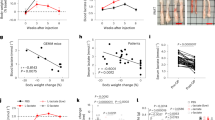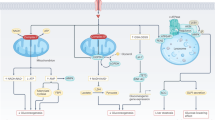Abstract
As a sensor of cellular energy status, the AMP-activated protein kinase (AMPK) is believed to act in opposition to the metabolic phenotypes favored by proliferating tumor cells. Consequently, compounds known to activate AMPK have been proposed as cancer therapeutics. However, the extent to which the anti-neoplastic properties of these agonists are mediated by AMPK is unclear. Here we examined the AMPK dependence of six commonly used AMPK agonists (metformin, phenformin, 5-aminoimidazole-4-carboxamide ribonucleotide (AICAR), 2-deoxy-D-glucose (2DG), salicylate and A-769662) and their influence on cellular processes often deregulated in tumor cells. We demonstrate that the majority of these agonists display AMPK-independent effects on cell proliferation and metabolism with only the synthetic activator, A-769662, exerting AMPK-dependent effects on these processes. We find that A-769662 promotes an AMPK-dependent increase in mitochondrial spare respiratory capacity. Finally, contrary to the view of AMPK activity being tumor suppressive, we find that A-769662 confers a selective proliferative advantage to tumor cells growing under nutrient deprivation. Our results indicate that many of the antigrowth properties of these agonists cannot be attributed to AMPK activity in cells, and thus any observed effects using these agonists should be confirmed using AMPK-deficient cells. Ultimately, our data urge caution not only regarding the type of AMPK agonist proposed for cancer treatment but also the context in which they are used.
This is a preview of subscription content, access via your institution
Access options
Subscribe to this journal
Receive 50 print issues and online access
$259.00 per year
only $5.18 per issue
Buy this article
- Purchase on Springer Link
- Instant access to full article PDF
Prices may be subject to local taxes which are calculated during checkout








Similar content being viewed by others
References
Suter M, Riek U, Tuerk R, Schlattner U, Wallimann T, Neumann D . Dissecting the role of 5′-AMP for allosteric stimulation, activation, and deactivation of AMP-activated protein kinase. J Biol Chem 2006; 281: 32207–32216.
Hardie DG . AMP-activated/SNF1 protein kinases: conserved guardians of cellular energy. Nat Rev Mol Cell Biol 2007; 8: 774–785.
Carling D . The AMP-activated protein kinase cascade—a unifying system for energy control. Trends Biochem Sci 2004; 29: 18–24.
Hardie DG . AMP-activated protein kinase: a cellular energy sensor with a key role in metabolic disorders and in cancer. Biochem Soc Trans 2011; 39: 1–13.
Davies SP, Sim AT, Hardie DG . Location and function of three sites phosphorylated on rat acetyl-CoA carboxylase by the AMP-activated protein kinase. Eur J Biochem 1990; 187: 183–190.
Gwinn DM, Shackelford DB, Egan DF, Mihaylova MM, Mery A, Vasquez DS et al. AMPK phosphorylation of raptor mediates a metabolic checkpoint. Mol Cell 2008; 30: 214–226.
Inoki K, Zhu T, Guan KL . TSC2 mediates cellular energy response to control cell growth and survival. Cell 2003; 115: 577–590.
Imamura K, Ogura T, Kishimoto A, Kaminishi M, Esumi H . Cell cycle regulation via p53 phosphorylation by a 5'-AMP activated protein kinase activator, 5-aminoimidazole- 4-carboxamide-1-beta-D-ribofuranoside, in a human hepatocellular carcinoma cell line. Biochem Biophys Res Commun 2001; 287: 562–567.
Jones RG, Plas DR, Kubek S, Buzzai M, Mu J, Xu Y et al. AMP-activated protein kinase induces a p53-dependent metabolic checkpoint. Mol Cell 2005; 18: 283–293.
Shackelford DB, Shaw RJ . The LKB1-AMPK pathway: metabolism and growth control in tumour suppression. Nat Rev Cancer 2009; 9: 563–575.
Hawley SA, Boudeau J, Reid JL, Mustard KJ, Udd L, Makela TP et al. Complexes between the LKB1 tumor suppressor, STRADalpha/beta and MO25alpha/beta are upstream kinases in the AMP-activated protein kinase cascade. J Biol 2003; 2: 28.
Alessi DR, Sakamoto K, Bayascas JR . LKB1-dependent signaling pathways. Annu Rev Biochem 2006; 75: 137–163.
Giardiello FM, Welsh SB, Hamilton SR, Offerhaus GJ, Gittelsohn AM, Booker SV et al. Increased risk of cancer in the Peutz-Jeghers syndrome. New Engl J Med 1987; 316: 1511–1514.
Hearle N, Schumacher V, Menko FH, Olschwang S, Boardman LA, Gille JJ et al. Frequency and spectrum of cancers in the Peutz-Jeghers syndrome. Clin Cancer Res 2006; 12: 3209–3215.
Sanchez-Cespedes M . A role for LKB1 gene in human cancer beyond the Peutz-Jeghers syndrome. Oncogene 2007; 26: 7825–7832.
Dupuy F, Griss T, Blagih J, Bridon G, Avizonis D, Ling C et al. LKB1 is a central regulator of tumor initiation and pro-growth metabolism in ErbB2-mediated breast cancer. Cancer Metab 2013; 1: 18.
Shackelford DB, Vasquez DS, Corbeil J, Wu S, Leblanc M, Wu CL et al. mTOR and HIF-1alpha-mediated tumor metabolism in an LKB1 mouse model of Peutz-Jeghers syndrome. Proc Natl Acad Sci USA 2009; 106: 11137–11142.
Faubert B, Boily G, Izreig S, Griss T, Samborska B, Dong Z et al. AMPK is a negative regulator of the Warburg effect and suppresses tumor growth in vivo. Cell Metab 2013; 17: 113–124.
Kim I, He YY . Targeting the AMP-activated protein kinase for cancer prevention and therapy. Front Oncol 2013; 3: 175.
Owen MR, Doran E, Halestrap AP . Evidence that metformin exerts its anti-diabetic effects through inhibition of complex 1 of the mitochondrial respiratory chain. Biochem J 2000; 348 (Pt 3): 607–614.
El-Mir MY, Nogueira V, Fontaine E, Averet N, Rigoulet M, Leverve X . Dimethylbiguanide inhibits cell respiration via an indirect effect targeted on the respiratory chain complex I. J Biol Chem 2000; 275: 223–228.
Evans JM, Donnelly LA, Emslie-Smith AM, Alessi DR, Morris AD . Metformin and reduced risk of cancer in diabetic patients. BMJ 2005; 330: 1304–1305.
Decensi A, Puntoni M, Goodwin P, Cazzaniga M, Gennari A, Bonanni B et al. Metformin and cancer risk in diabetic patients: a systematic review and meta-analysis. Cancer Prev Res (Phila) 2010; 3: 1451–1461.
Buzzai M, Jones RG, Amaravadi RK, Lum JJ, DeBerardinis RJ, Zhao F et al. Systemic treatment with the antidiabetic drug metformin selectively impairs p53-deficient tumor cell growth. Cancer Res 2007; 67: 6745–6752.
Wu N, Gu C, Gu H, Hu H, Han Y, Li Q . Metformin induces apoptosis of lung cancer cells through activating JNK/p38 MAPK pathway and GADD153. Neoplasma 2011; 58: 482–490.
Appleyard MV, Murray KE, Coates PJ, Wullschleger S, Bray SE, Kernohan NM et al. Phenformin as prophylaxis and therapy in breast cancer xenografts. Br J Cancer 2012; 106: 1117–1122.
Pollak M . Potential applications for biguanides in oncology. J Clin Invest 2013; 123: 3693–3700.
Corton JM, Gillespie JG, Hawley SA, Hardie DG . 5-aminoimidazole-4-carboxamide ribonucleoside A specific method for activating AMP-activated protein kinase in intact cells? Eur J Biochem 1995; 229: 558–565.
El-Masry OS, Brown BL, Dobson PR . Effects of activation of AMPK on human breast cancer cell lines with different genetic backgrounds. Oncol Lett 2012; 3: 224–228.
Rosilio C, Lounnas N, Nebout M, Imbert V, Hagenbeek T, Spits H et al. The metabolic perturbators metformin, phenformin and AICAR interfere with the growth and survival of murine PTEN-deficient T cell lymphomas and human T-ALL/T-LL cancer cells. Cancer Lett 2013; 336: 114–126.
Cool B, Zinker B, Chiou W, Kifle L, Cao N, Perham M et al. Identification and characterization of a small molecule AMPK activator that treats key components of type 2 diabetes and the metabolic syndrome. Cell Metab 2006; 3: 403–416.
Hawley SA, Fullerton MD, Ross FA, Schertzer JD, Chevtzoff C, Walker KJ et al. The ancient drug salicylate directly activates AMP-activated protein kinase. Science 2013; 336: 918–922.
Elder DJ, Hague A, Hicks DJ, Paraskeva C . Differential growth inhibition by the aspirin metabolite salicylate in human colorectal tumor cell lines: enhanced apoptosis in carcinoma and in vitro-transformed adenoma relative to adenoma relative to adenoma cell lines. Cancer Res 1996; 56: 2273–2276.
Hardie DG . AMPK: a target for drugs and natural products with effects on both diabetes and cancer. Diabetes 2013; 62: 2164–2172.
Liang J, Shao SH, Xu ZX, Hennessy B, Ding Z, Larrea M et al. The energy sensing LKB1-AMPK pathway regulates p27(kip1) phosphorylation mediating the decision to enter autophagy or apoptosis. Nat Cell Biol 2007; 9: 218–224.
Bungard D, Fuerth BJ, Zeng PY, Faubert B, Maas NL, Viollet B et al. Signaling kinase AMPK activates stress-promoted transcription via histone H2B phosphorylation. Science 2010; 329: 1201–1205.
Zannella VE, Cojocari D, Hilgendorf S, Vellanki RN, Chung S, Wouters BG et al. AMPK regulates metabolism and survival in response to ionizing radiation. Radiother Oncol 2011; 99: 293–299.
Vander Heiden MG, Cantley LC, Thompson CB . Understanding the Warburg effect: the metabolic requirements of cell proliferation. Science 2009; 324: 1029–1033.
Liang J, Mills G . AMPK: a contextual oncogene or tumor suppressor? Cancer Res 2013; 73: 2929–2935.
Pachman L, Esterly N, Peterson R . The effect of salicylate on the metabolism of normal and stimulated human lymphocytes in vitro. J Clin Invest 1971; 50: 226–230.
Brody T . Action of sodium salicylate and related compounds on tissue metabolism in vitro. J Pharmacol Exp Ther 1956; 117: 39–51.
Nicholls DG . Spare respiratory capacity, oxidative stress and excitotoxicity. Biochem Soc Trans 2009; 37: 1385–1388.
Hawley SA, Pan DA, Mustard KJ, Ross L, Bain J, Edelman AM et al. Calmodulin-dependent protein kinase kinase-beta is an alternative upstream kinase for AMP-activated protein kinase. Cell Metab 2005; 2: 9–19.
Goransson O, McBride A, Hawley SA, Ross FA, Shpiro N, Foretz M et al. Mechanism of action of A-769662, a valuable tool for activation of AMP-activated protein kinase. J Biol Chem 2007; 282: 32549–32560.
Kalender A, Selvaraj A, Kim SY, Gulati P, Brule S, Viollet B et al. Metformin, independent of AMPK, inhibits mTORC1 in a rag GTPase-dependent manner. Cell Metab 2010; 11: 390–401.
Zakikhani M, Dowling R, Fantus IG, Sonenberg N, Pollak M . Metformin is an AMP kinase-dependent growth inhibitor for breast cancer cells. Cancer Res 2006; 66: 10269–10273.
Dykens JA, Jamieson J, Marroquin L, Nadanaciva S, Billis PA, Will Y . Biguanide-induced mitochondrial dysfunction yields increased lactate production and cytotoxicity of aerobically-poised HepG2 cells and human hepatocytes in vitro. Toxicol Appl Pharmacol 2008; 233: 203–210.
Shu Y, Sheardown SA, Brown C, Owen RP, Zhang S, Castro RA et al. Effect of genetic variation in the organic cation transporter 1 (OCT1) on metformin action. J Clin Invest 2007; 117: 1422–1431.
Zadra G, Photopoulos C, Tyekucheva S, Heidari P, Weng QP, Fedele G et al. A novel direct activator of AMPK inhibits prostate cancer growth by blocking lipogenesis. EMBO Mol Med 2014; 6: 519–538.
Huang X, Wullschleger S, Shpiro N, McGuire VA, Sakamoto K, Woods YL et al. Important role of the LKB1-AMPK pathway in suppressing tumorigenesis in PTEN-deficient mice. Biochem J 2008; 412: 211–221.
Shackelford DB, Abt E, Gerken L, Vasquez DS, Seki A, Leblanc M et al. LKB1 inactivation dictates therapeutic response of non-small cell lung cancer to the metabolism drug phenformin. Cancer Cell 2013; 23: 143–158.
Faubert B, Vincent EE, Poffenberger MC, Jones RG . The AMP-activated protein kinase (AMPK) and cancer: many faces of a metabolic regulator. Cancer letters 2014.
Garber K . Energy deregulation: licensing tumors to grow. Science 2006; 312: 1158–1159.
Guigas B, Bertrand L, Taleux N, Foretz M, Wiernsperger N, Vertommen D et al. 5-Aminoimidazole-4-carboxamide-1-beta-D-ribofuranoside and metformin inhibit hepatic glucose phosphorylation by an AMP-activated protein kinase-independent effect on glucokinase translocation. Diabetes 2006; 55: 865–874.
Vincent MF, Bontemps F, Van den Berghe G . Inhibition of glycolysis by 5-amino-4-imidazolecarboxamide riboside in isolated rat hepatocytes. Biochem J 1992; 281 (Pt 1): 267–272.
Morita M, Gravel SP, Chenard V, Sikstrom K, Zheng L, Alain T et al. mTORC1 controls mitochondrial activity and biogenesis through 4E-BP-dependent translational regulation. Cell Metab 2013; 18: 698–711.
Brand MD, Nicholls DG . Assessing mitochondrial dysfunction in cells. Biochem J 2011; 435: 297–312.
Jeon SM, Chandel NS, Hay N . AMPK regulates NADPH homeostasis to promote tumour cell survival during energy stress. Nature 2012; 485: 661–665.
Godlewski J, Nowicki MO, Bronisz A, Nuovo G, Palatini J, De Lay M et al. MicroRNA-451 regulates LKB1/AMPK signaling and allows adaptation to metabolic stress in glioma cells. Mol Cell 2010; 37: 620–632.
Chhipa RR, Wu Y, Mohler JL, Ip C . Survival advantage of AMPK activation to androgen-independent prostate cancer cells during energy stress. Cell Signal 2010; 22: 1554–1561.
Laderoute KR, Amin K, Calaoagan JM, Knapp M, Le T, Orduna J et al. 5′-AMP-activated protein kinase (AMPK) is induced by low-oxygen and glucose deprivation conditions found in solid-tumor microenvironments. Mol Cell Biol 2006; 26: 5336–5347.
Crissman HA, Steinkamp JA . simultaneous measurement of DNA, protein, and cell volume in single cells from large mammalian cell populations. J Cell Biol 1973; 59: 766–771.
Vincent EE, Elder DJ, Curwen J, Kilgour E, Hers I, Tavare JM . Targeting non-small cell lung cancer cells by dual inhibition of the insulin receptor and the insulin-like growth factor-1 receptor. PLoS ONE 2013; 8: e66963.
Faubert B, Vincent EE, Griss T, Samborska B, Izreig S, Svensson RU et al. Loss of the tumor suppressor LKB1 promotes metabolic reprogramming of cancer cells via HIF-1alpha. Proc Natl Acad Sci USA 2014; 111: 2554–2559.
Acknowledgements
We acknowledge Douglas Elder and Nicole Beauchemin, and members of the Jones Laboratory for critical reading of this manuscript. EEV, PPC and TG were funded by the McGill Integrated Cancer Research Training Program (MICRTP) and JB was funded by Fonds de researche Santé Québec. This work was supported by grants to RGJ from the Canadian Institute Health Research (CIHR) (MOP-93799), Canadian Cancer Society (2010-700586) and Terry Fox Research Foundation (TEF-116128). This work is dedicated to the memory of Rosalind Goodman.
Author information
Authors and Affiliations
Corresponding author
Ethics declarations
Competing interests
The authors declare no conflict of interest.
Additional information
Supplementary Information accompanies this paper on the Oncogene website
Rights and permissions
About this article
Cite this article
Vincent, E., Coelho, P., Blagih, J. et al. Differential effects of AMPK agonists on cell growth and metabolism. Oncogene 34, 3627–3639 (2015). https://doi.org/10.1038/onc.2014.301
Received:
Revised:
Accepted:
Published:
Issue Date:
DOI: https://doi.org/10.1038/onc.2014.301
This article is cited by
-
Activity-based directed evolution of a membrane editor in mammalian cells
Nature Chemistry (2023)
-
The mixed blessing of AMPK signaling in Cancer treatments
BMC Cancer (2022)
-
Bone morphogenetic protein inhibitors and mitochondria targeting agents synergistically induce apoptosis-inducing factor (AIF) caspase-independent cell death in lung cancer cells
Cell Communication and Signaling (2022)
-
Regulation and role of CAMKK2 in prostate cancer
Nature Reviews Urology (2022)
-
Molecular mechanisms of exercise contributing to tissue regeneration
Signal Transduction and Targeted Therapy (2022)



